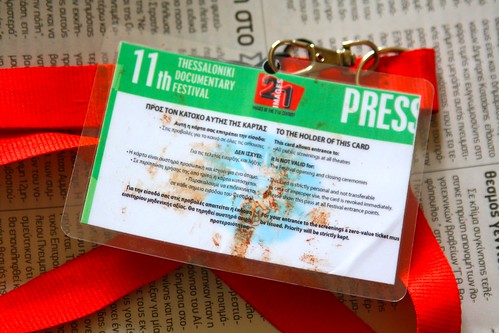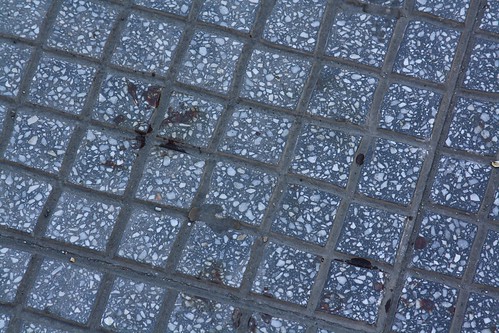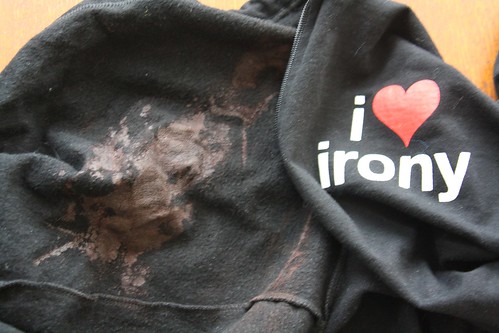 FACE DOWN ON THE TABLE IN THE EMERGENCY ROOM
FACE DOWN ON THE TABLE IN THE EMERGENCY ROOM, I hold stock-still as the young doctor with the needle poised to pierce my scalp deadpans, "How are you enjoying our Greek hospitality?" Two female doctors in training, tall, longhaired brunettes, giggle at his banter between instructions in their language: he's fascinated that I'm calm after being attacked by a mob. "So you're a photojournalist?" "
Po-po journalist, it seems," I joke, using slang that's an all purpose "oh-oh." The women giggle. "I don't get it," he says, as he pulls thread through my lacerated skin.
It's been a little more than a month since that Sunday night and most aches have subsided. My insurance covered the CAT scan and other tests once I was back in the States, assuring nothing might be permanently awry. Cumulatively, I've spent almost six months of my life in the north of Greece but this is the first time I've been taken for an anarchist infiltrator and
roughed up by a gang of nationalists. [
Machine translation]
Thessaloniki is a city of just over a million. Street protests are common, prevalent, even. One cloudy afternoon a couple of years ago, I asked a cop in knee-high black boots standing beside his motorcycle as a main artery was filled with red flags of a communist youth party and black flags of some anarchist faction, what's this one about? "Just another regularly scheduled spontaneous demonstration," he answered.
That Sunday was the last of ten days of the eleventh Thessaloniki International Documentary Festival. I had been watching films and talking to directors and photographers and programmers for a print piece for Filmmaker magazine. The usual suspects: homelessness, globalization, genocide. Earlier, I'd had conversations with a young Rwandan director who made one of several films about that last topic as part of a section of films made specifically by African directors. I had a drink with a few filmmakers and colleagues and chose to stop by a friends' apartment rather than ending the event on the bloody note of his film:
he is a good storyteller and I'd gotten more than the gist of the horror, physical and moral, of that tragedy.
Along the eight blocks to the apartment, a square bristles with a crowd of middle-aged men listening to an energetic older man. A rank of blinding bright white lights stands between the speaker and the Byzantine edifice behind him. This is the square of Agia Sofia, the "Church of the Holy Wisdom." It's a neighborhood I know well; I feel safe. The words of his urgent peroration that I understand are mostly along the lines of "homeland" and "patriotism." Riot police stand at the perimeter of the gathering. I have my DSLR camera with me, walk past without even framing a picture. I move along. "Homeland." "Patriotism."

Journalists watch, movie reviewers watch, photographers watch, used to seeing. Seeing without being seen, as well. I was about to get a simple lesson in observation. The speaker's voice resounds through the shutters of the flat several blocks away. "Homeland. "Patriotism." I take the same route half-an-hour later, 9:15, after dark. Observing, I reach toward my unzipped camera bag, more to protect its contents than to take out any equipment. Three, then four middle-aged men are abruptly in my face shouting in Greek, "Who are you?" "Who sent you?" "What are you doing?" I'm surrounded. I move to protect my bag as punches fly and fall.
Sloppy punches and kicks from a dozen men in a mob scrum are always to be preferred over two guys in an alley. If you get dragged free soon enough, it's more roughing up than being beaten stupid. Still, there's blood. The velocity of the event? Under two minutes, I would guess.

I was told later the men who kicked, swung, slapped, as I crouched on the ground to protect my face, might have taken me for "an anarchist infiltrator." Fast, furious. Less than two minutes and about a pint of blood later, soaking my hair and cascading down the back of my jacket, police pull me away, to insure "bodily integrity," as the term of art of Greek law has it. Adrenaline brings clarity. My upturned palms are covered with blood from the gash on the back of my head. I hold them up. "American… Journalist…
NOT political. What do you need?" My fingerprints blood my press pass as I hand it across.
A rare incident, I'm assured later by Greek friends, the police, the U. S. Consulate. And a modest one compared to the blood that had run through the aisles during so many of the thirty or so documentaries I'd seen in the ten days prior. Greek friends expressed concern about the temperature in their streets: these were the middle-aged fed up with riots in the streets of cities since the December shooting of a 15-year-old boy in the Exarchia district of Athens. What had I done? What a reviewer, a journalist, a photographer does. Just looking. My "crime." Just being seen looking. And remembering the image of my two bloody hands, red,
La chinoise-red, which I could not take a picture of.
CODA: Last week I saw
Z for the first time in memory. Costa-Gavras' restored thriller is the most authentic representation of getting your head lacerated in Greek street violence that I know. My injuries were in almost the same place on the back of the skull as those that kill Yves Montand's political figure. I sat stock-still, rapt with fascination.







